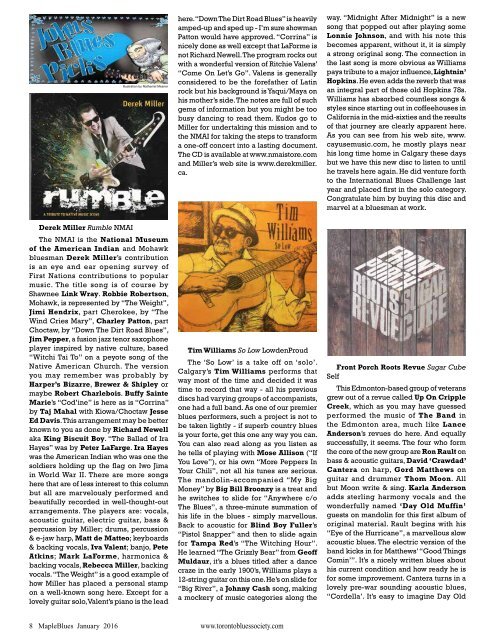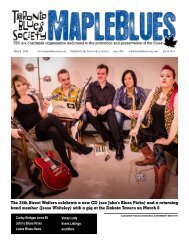Bonnie Raitt plays Toronto's Sony Centre for the Performing Arts on March 15th
mb1601v7-WEB
mb1601v7-WEB
You also want an ePaper? Increase the reach of your titles
YUMPU automatically turns print PDFs into web optimized ePapers that Google loves.
Illustrati<strong>on</strong> by Nathaniel Mesner<br />
here. “Down The Dirt Road Blues” is heavily<br />
amped-up and sped up - I’m sure showman<br />
Patt<strong>on</strong> would have approved. “Corrina” is<br />
nicely d<strong>on</strong>e as well except that LaForme is<br />
not Richard Newell. The program rocks out<br />
with a w<strong>on</strong>derful versi<strong>on</strong> of Ritchie Valens’<br />
“Come On Let’s Go”. Valens is generally<br />
c<strong>on</strong>sidered to be <str<strong>on</strong>g>the</str<strong>on</strong>g> <str<strong>on</strong>g>for</str<strong>on</strong>g>efa<str<strong>on</strong>g>the</str<strong>on</strong>g>r of Latin<br />
rock but his background is Yaqui/Maya <strong>on</strong><br />
his mo<str<strong>on</strong>g>the</str<strong>on</strong>g>r’s side. The notes are full of such<br />
gems of in<str<strong>on</strong>g>for</str<strong>on</strong>g>mati<strong>on</strong> but you might be too<br />
busy dancing to read <str<strong>on</strong>g>the</str<strong>on</strong>g>m. Kudos go to<br />
Miller <str<strong>on</strong>g>for</str<strong>on</strong>g> undertaking this missi<strong>on</strong> and to<br />
<str<strong>on</strong>g>the</str<strong>on</strong>g> NMAI <str<strong>on</strong>g>for</str<strong>on</strong>g> taking <str<strong>on</strong>g>the</str<strong>on</strong>g> steps to trans<str<strong>on</strong>g>for</str<strong>on</strong>g>m<br />
a <strong>on</strong>e-off c<strong>on</strong>cert into a lasting document.<br />
The CD is available at www.nmaistore.com<br />
and Miller’s web site is www.derekmiller.<br />
ca.<br />
way. “Midnight After Midnight” is a new<br />
s<strong>on</strong>g that popped out after playing some<br />
L<strong>on</strong>nie Johns<strong>on</strong>, and with his note this<br />
becomes apparent, without it, it is simply<br />
a str<strong>on</strong>g original s<strong>on</strong>g. The c<strong>on</strong>necti<strong>on</strong> in<br />
<str<strong>on</strong>g>the</str<strong>on</strong>g> last s<strong>on</strong>g is more obvious as Williams<br />
pays tribute to a major influence, Lightnin’<br />
Hopkins. He even adds <str<strong>on</strong>g>the</str<strong>on</strong>g> reverb that was<br />
an integral part of those old Hopkins 78s.<br />
Williams has absorbed countless s<strong>on</strong>gs &<br />
styles since starting out in coffeehouses in<br />
Cali<str<strong>on</strong>g>for</str<strong>on</strong>g>nia in <str<strong>on</strong>g>the</str<strong>on</strong>g> mid-sixties and <str<strong>on</strong>g>the</str<strong>on</strong>g> results<br />
of that journey are clearly apparent here.<br />
As you can see from his web site, www.<br />
cayusemusic.com, he mostly <str<strong>on</strong>g>plays</str<strong>on</strong>g> near<br />
his l<strong>on</strong>g time home in Calgary <str<strong>on</strong>g>the</str<strong>on</strong>g>se days<br />
but we have this new disc to listen to until<br />
he travels here again. He did venture <str<strong>on</strong>g>for</str<strong>on</strong>g>th<br />
to <str<strong>on</strong>g>the</str<strong>on</strong>g> Internati<strong>on</strong>al Blues Challenge last<br />
year and placed first in <str<strong>on</strong>g>the</str<strong>on</strong>g> solo category.<br />
C<strong>on</strong>gratulate him by buying this disc and<br />
marvel at a bluesman at work.<br />
Derek Miller Rumble NMAI<br />
The NMAI is <str<strong>on</strong>g>the</str<strong>on</strong>g> Nati<strong>on</strong>al Museum<br />
of <str<strong>on</strong>g>the</str<strong>on</strong>g> American Indian and Mohawk<br />
bluesman Derek Miller’s c<strong>on</strong>tributi<strong>on</strong><br />
is an eye and ear opening survey of<br />
First Nati<strong>on</strong>s c<strong>on</strong>tributi<strong>on</strong>s to popular<br />
music. The title s<strong>on</strong>g is of course by<br />
Shawnee Link Wray. Robbie Roberts<strong>on</strong>,<br />
Mohawk, is represented by “The Weight”,<br />
Jimi Hendrix, part Cherokee, by “The<br />
Wind Cries Mary”, Charley Patt<strong>on</strong>, part<br />
Choctaw, by “Down The Dirt Road Blues”,<br />
Jim Pepper, a fusi<strong>on</strong> jazz tenor saxoph<strong>on</strong>e<br />
player inspired by native culture, based<br />
“Witchi Tai To” <strong>on</strong> a peyote s<strong>on</strong>g of <str<strong>on</strong>g>the</str<strong>on</strong>g><br />
Native American Church. The versi<strong>on</strong><br />
you may remember was probably by<br />
Harper’s Bizarre, Brewer & Shipley or<br />
maybe Robert Charlebois. Buffy Sainte<br />
Marie’s “Cod’ine” is here as is “Corrina”<br />
by Taj Mahal with Kiowa/Choctaw Jesse<br />
Ed Davis. This arrangement may be better<br />
known to you as d<strong>on</strong>e by Richard Newell<br />
aka King Biscuit Boy. “The Ballad of Ira<br />
Hayes” was by Peter LaFarge. Ira Hayes<br />
was <str<strong>on</strong>g>the</str<strong>on</strong>g> American Indian who was <strong>on</strong>e <str<strong>on</strong>g>the</str<strong>on</strong>g><br />
soldiers holding up <str<strong>on</strong>g>the</str<strong>on</strong>g> flag <strong>on</strong> Iwo Jima<br />
in World War II. There are more s<strong>on</strong>gs<br />
here that are of less interest to this column<br />
but all are marvelously per<str<strong>on</strong>g>for</str<strong>on</strong>g>med and<br />
beautifully recorded in well-thought-out<br />
arrangements. The players are: vocals,<br />
acoustic guitar, electric guitar, bass &<br />
percussi<strong>on</strong> by Miller; drums, percussi<strong>on</strong><br />
& e-jaw harp, Matt de Matteo; keyboards<br />
& backing vocals, Iva Valent; banjo, Pete<br />
Atkins; Mark LaForme, harm<strong>on</strong>ica &<br />
backing vocals, Rebecca Miller, backing<br />
vocals. “The Weight” is a good example of<br />
how Miller has placed a pers<strong>on</strong>al stamp<br />
<strong>on</strong> a well-known s<strong>on</strong>g here. Except <str<strong>on</strong>g>for</str<strong>on</strong>g> a<br />
lovely guitar solo, Valent’s piano is <str<strong>on</strong>g>the</str<strong>on</strong>g> lead<br />
Tim Williams So Low LowdenProud<br />
The ‘So Low’ is a take off <strong>on</strong> ‘solo’.<br />
Calgary’s Tim Williams per<str<strong>on</strong>g>for</str<strong>on</strong>g>ms that<br />
way most of <str<strong>on</strong>g>the</str<strong>on</strong>g> time and decided it was<br />
time to record that way - all his previous<br />
discs had varying groups of accompanists,<br />
<strong>on</strong>e had a full band. As <strong>on</strong>e of our premier<br />
blues per<str<strong>on</strong>g>for</str<strong>on</strong>g>mers, such a project is not to<br />
be taken lightly - if superb country blues<br />
is your <str<strong>on</strong>g>for</str<strong>on</strong>g>te, get this <strong>on</strong>e any way you can.<br />
You can also read al<strong>on</strong>g as you listen as<br />
he tells of playing with Mose Allis<strong>on</strong> (“If<br />
You Love”), or his own “More Peppers In<br />
Your Chili”, not all his tunes are serious.<br />
The mandolin-accompanied “My Big<br />
M<strong>on</strong>ey” by Big Bill Bro<strong>on</strong>zy is a treat and<br />
he switches to slide <str<strong>on</strong>g>for</str<strong>on</strong>g> “Anywhere c/o<br />
The Blues”, a three-minute summati<strong>on</strong> of<br />
his life in <str<strong>on</strong>g>the</str<strong>on</strong>g> blues - simply marvellous.<br />
Back to acoustic <str<strong>on</strong>g>for</str<strong>on</strong>g> Blind Boy Fuller’s<br />
“Pistol Snapper” and <str<strong>on</strong>g>the</str<strong>on</strong>g>n to slide again<br />
<str<strong>on</strong>g>for</str<strong>on</strong>g> Tampa Red’s “The Witching Hour”.<br />
He learned “The Grizzly Bear” from Geoff<br />
Muldaur, it’s a blues titled after a dance<br />
craze in <str<strong>on</strong>g>the</str<strong>on</strong>g> early 1900’s, Williams <str<strong>on</strong>g>plays</str<strong>on</strong>g> a<br />
12-string guitar <strong>on</strong> this <strong>on</strong>e. He’s <strong>on</strong> slide <str<strong>on</strong>g>for</str<strong>on</strong>g><br />
“Big River”, a Johnny Cash s<strong>on</strong>g, making<br />
a mockery of music categories al<strong>on</strong>g <str<strong>on</strong>g>the</str<strong>on</strong>g><br />
Fr<strong>on</strong>t Porch Roots Revue Sugar Cube<br />
Self<br />
This Edm<strong>on</strong>t<strong>on</strong>-based group of veterans<br />
grew out of a revue called Up On Cripple<br />
Creek, which as you may have guessed<br />
per<str<strong>on</strong>g>for</str<strong>on</strong>g>med <str<strong>on</strong>g>the</str<strong>on</strong>g> music of The Band in<br />
<str<strong>on</strong>g>the</str<strong>on</strong>g> Edm<strong>on</strong>t<strong>on</strong> area, much like Lance<br />
Anders<strong>on</strong>’s revues do here. And equally<br />
successfully, it seems. The four who <str<strong>on</strong>g>for</str<strong>on</strong>g>m<br />
<str<strong>on</strong>g>the</str<strong>on</strong>g> core of <str<strong>on</strong>g>the</str<strong>on</strong>g> new group are R<strong>on</strong> Rault <strong>on</strong><br />
bass & acoustic guitars, David ‘Crawdad’<br />
Cantera <strong>on</strong> harp, Gord Mat<str<strong>on</strong>g>the</str<strong>on</strong>g>ws <strong>on</strong><br />
guitar and drummer Thom Mo<strong>on</strong>. All<br />
but Mo<strong>on</strong> write & sing. Karla Anders<strong>on</strong><br />
adds sterling harm<strong>on</strong>y vocals and <str<strong>on</strong>g>the</str<strong>on</strong>g><br />
w<strong>on</strong>derfully named ‘Day Old Muffin’<br />
guests <strong>on</strong> mandolin <str<strong>on</strong>g>for</str<strong>on</strong>g> this first album of<br />
original material. Rault begins with his<br />
“Eye of <str<strong>on</strong>g>the</str<strong>on</strong>g> Hurricane”, a marvellous slow<br />
acoustic blues. The electric versi<strong>on</strong> of <str<strong>on</strong>g>the</str<strong>on</strong>g><br />
band kicks in <str<strong>on</strong>g>for</str<strong>on</strong>g> Mat<str<strong>on</strong>g>the</str<strong>on</strong>g>ws’ “Good Things<br />
Comin’”. It’s a nicely written blues about<br />
his current c<strong>on</strong>diti<strong>on</strong> and how ready he is<br />
<str<strong>on</strong>g>for</str<strong>on</strong>g> some improvement. Cantera turns in a<br />
lovely pre-war sounding acoustic blues,<br />
“Cordella’. It’s easy to imagine Day Old<br />
8 MapleBlues January 2016 www.tor<strong>on</strong>tobluessociety.com



